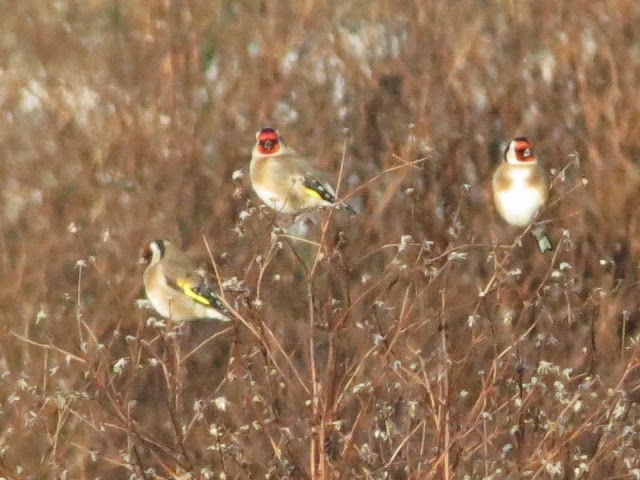Welcome to the Midnight Collective Broadsheet
19
Actively supporting NZ’s endangered wetland birds
It has been 3 months since
the dune lake went into summer hibernation during which we’ve had a late indian
summer. Curiously the pukeko family, around 7 birds, that raised a February/March chick, have stayed in
residence this year (they left last year during the drought).
Weeds have taken over in the wetland, but are seasonally late and only just coming into seed. These weeds aren’t all bad news because they attract honey bees, and provide feed for pukeko and then the exotic goldfinches though the flock of these birds is about a third the size of last year.
 |
| Goldfinches autumn 2014 |
 |
| Pukeko -dune lake May 5 |
Weeds have taken over in the wetland, but are seasonally late and only just coming into seed. These weeds aren’t all bad news because they attract honey bees, and provide feed for pukeko and then the exotic goldfinches though the flock of these birds is about a third the size of last year.
The special quality of a dune lake comes from its seasonal character so in its original state it would have hosted local native plants adapted to survive in difficult climactic conditions. These flora are not unlike that found in alpine regions – plants that are toughened to the conditions but that are also very beautiful. Development has expunged these plants, including raupo from this area though a new colony of rushes -wīwī- appears to be establishing in the centre of what will become the lake.
The first sign that the
wetlands were returning was three weeks ago as we began to get persistent
though not heavy autumn rain. The small wetland on the northern side of the
Wharemauku was the first to return though cattle have been allowed to gather in
this slough, and it has become fouled. It will clean up over time, though the
effluent will seep as pollutant into the Wharemauku.
 |
| Current view of dune lake May 6 2013 |
 |
| The same vista in mid-June 2013 |
What remains astonishing
is that this area is attracting so many species some of which are rare and
endangered, right into the middle of town. Here is an attraction ready made for
visitors and eco-tourism, and yet a year from now the entire area will be
bulldozed.
Track we were listening to while posting this Jimi Hendrix
If 6 was 9
Track we were listening to while posting this Jimi Hendrix
If 6 was 9
Go ahead on Mr. Business man,
you can't dress like me.
Sing on Brother,
play on drummer.

No comments:
Post a Comment